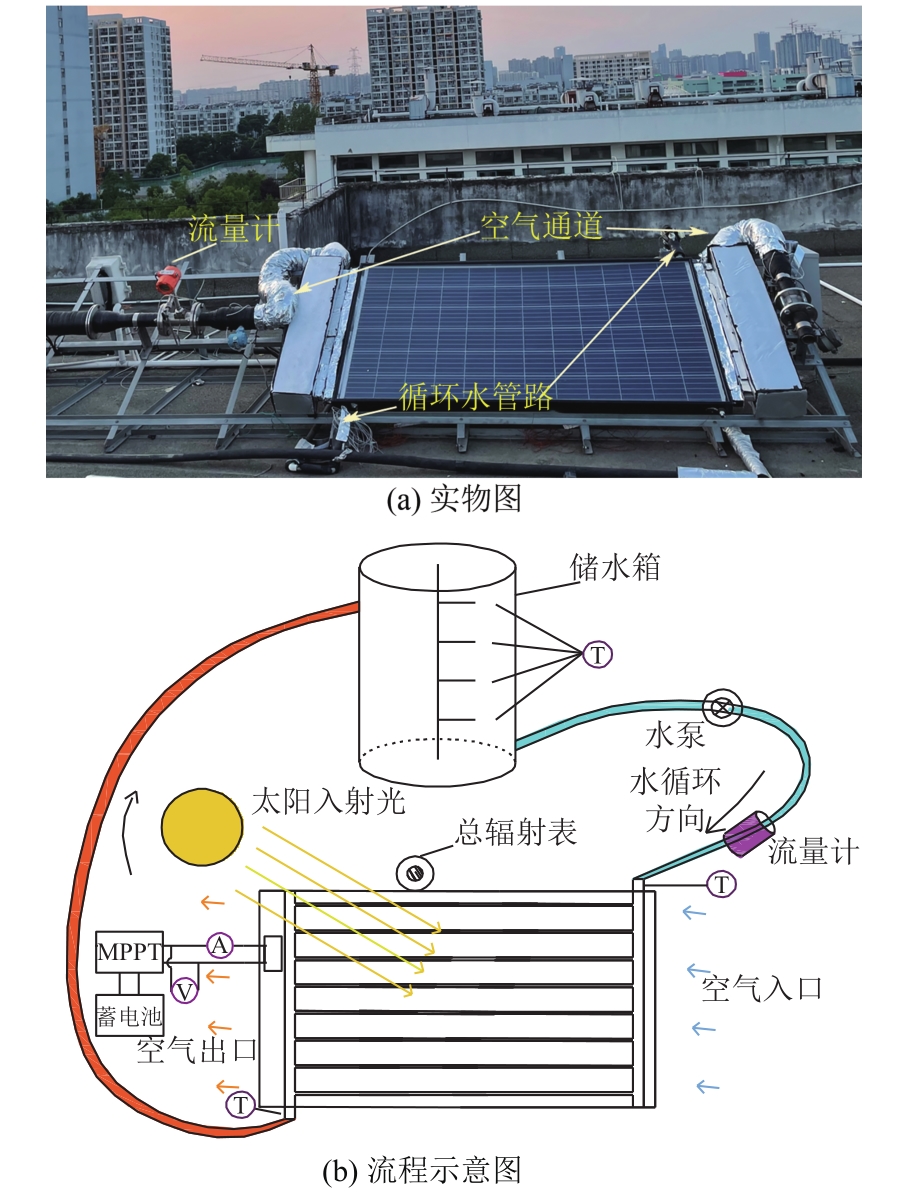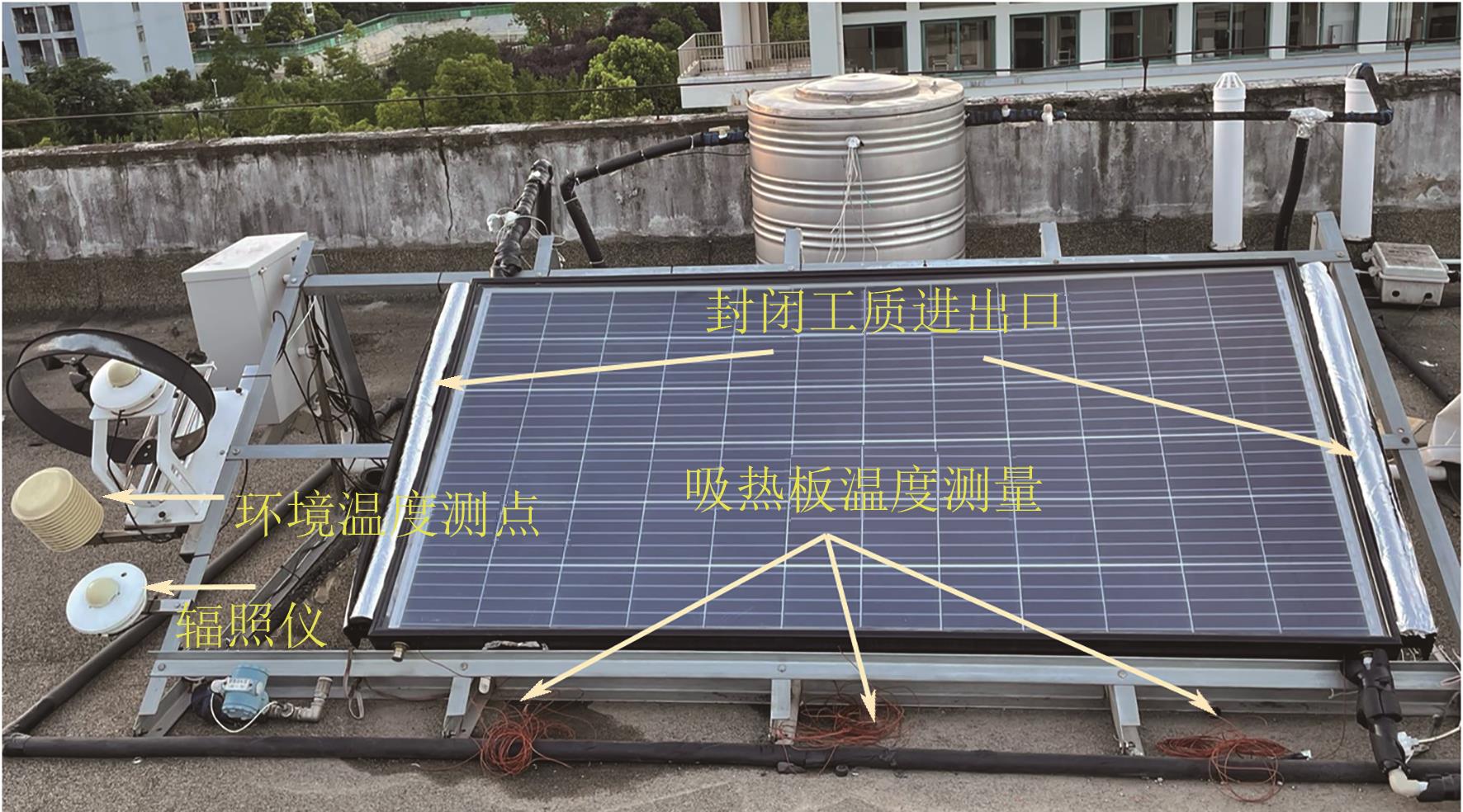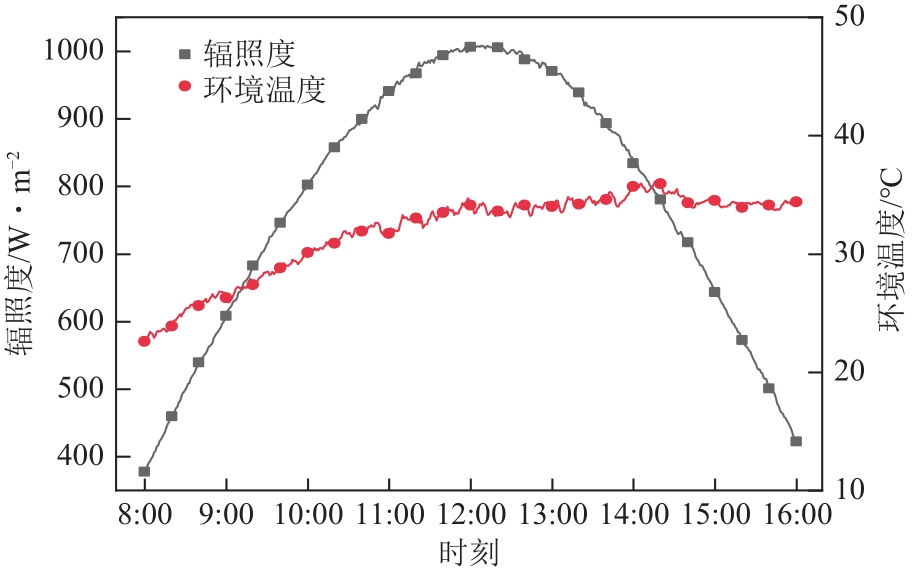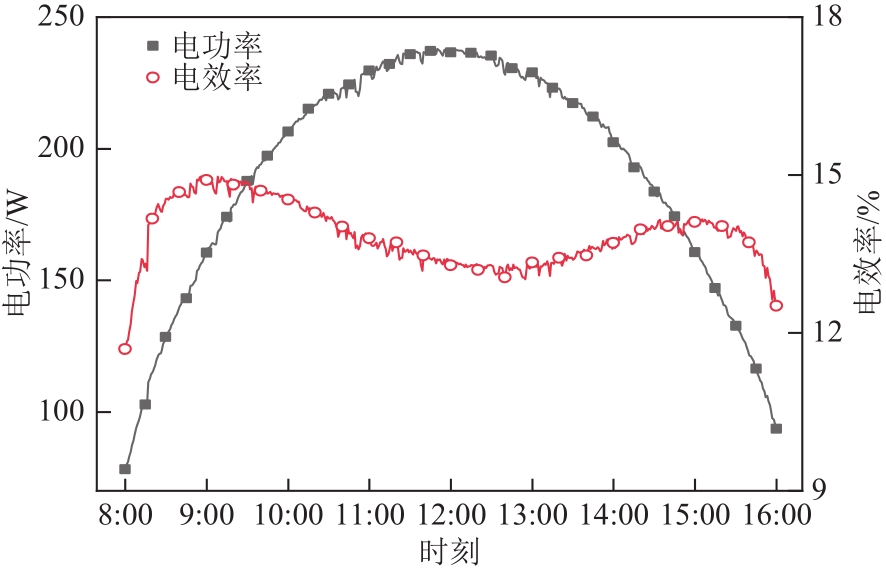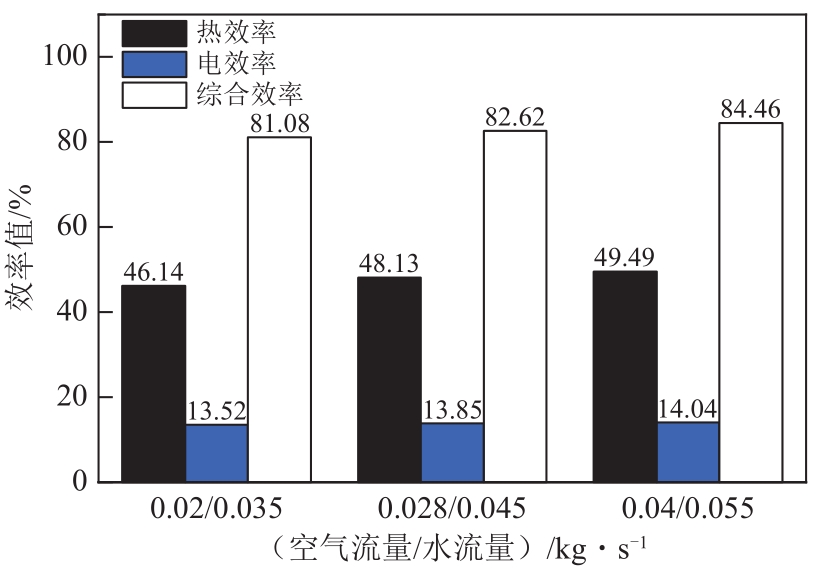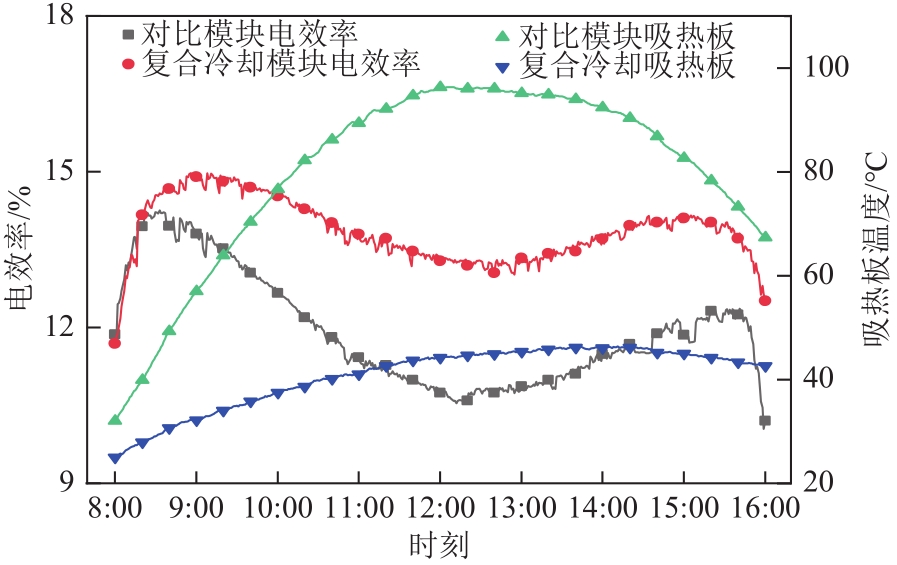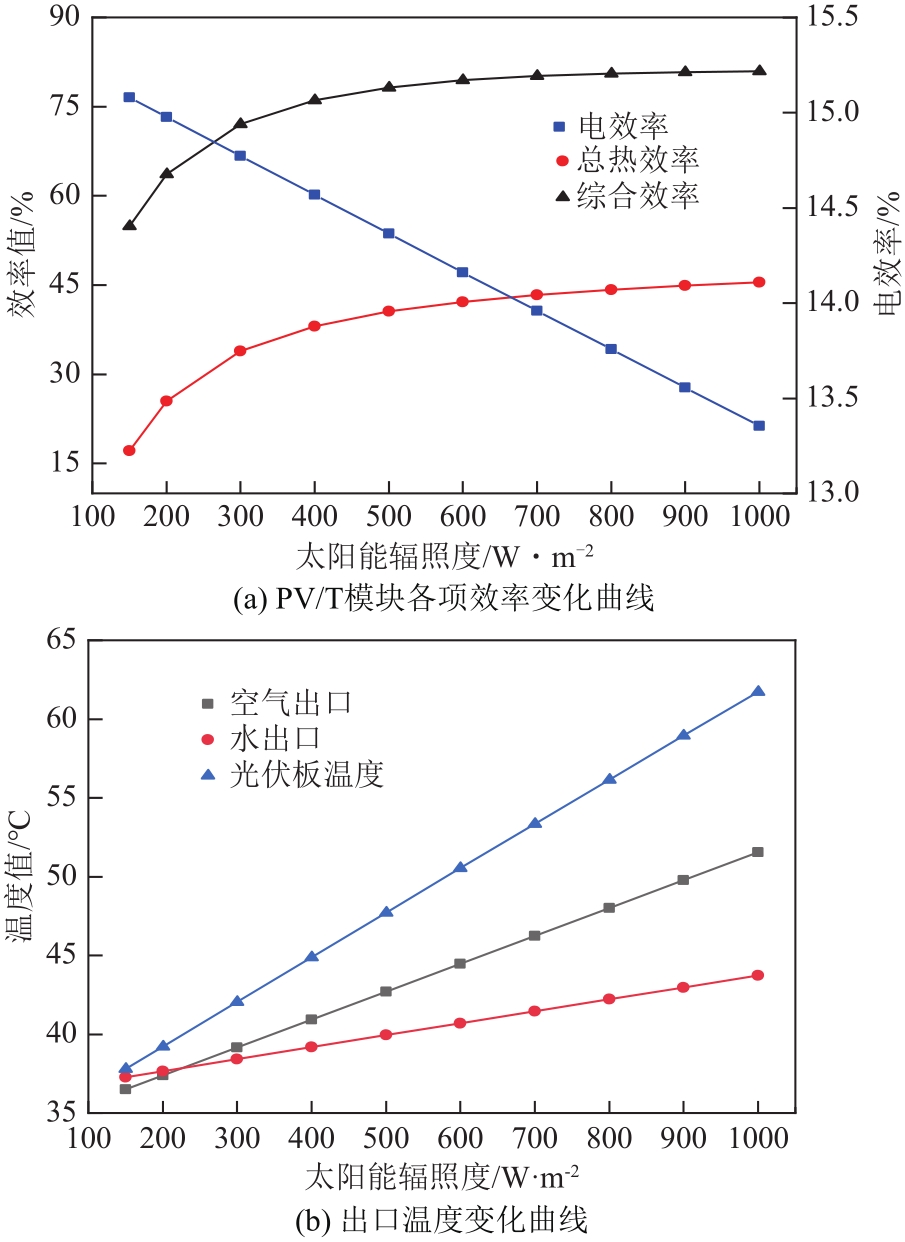Chemical Industry and Engineering Progress ›› 2023, Vol. 42 ›› Issue (2): 722-730.DOI: 10.16085/j.issn.1000-6613.2022-0660
• Energy processes and technology • Previous Articles Next Articles
Comparison test and numerical simulation analysis of PV/T module composite cooling mode
DU Tao( ), MA Jinwei(
), MA Jinwei( ), CHEN Qianqian, FANG Hao, CHEN Bingzhang, CHEN Houren
), CHEN Qianqian, FANG Hao, CHEN Bingzhang, CHEN Houren
- School of Environment and Energy Engineering, Anhui Jianzhu University, Hefei 230601, Anhui, China
-
Received:2022-04-14Revised:2022-06-27Online:2023-03-13Published:2023-02-25 -
Contact:MA Jinwei
PV/T模块复合冷却模式性能对比测试与数值模拟分析
杜涛( ), 马进伟(
), 马进伟( ), 陈茜茜, 方浩, 陈秉章, 陈厚仁
), 陈茜茜, 方浩, 陈秉章, 陈厚仁
- 安徽建筑大学环境与能源工程学院,安徽 合肥 230601
-
通讯作者:马进伟 -
作者简介:杜涛(1999—),男,硕士研究生,研究方向为太阳能综合利用。E-mail:dutaoahjz@163.com。 -
基金资助:安徽高校协同创新项目(GXXT-2019-019);安徽省高校自然科学研究项目(KJ2020JD15);中国科协优秀中外青年交流计划(2019年度);安徽省教育厅高校优秀拔尖人才培育项目(2020年度);安徽省重点研究与开发计划(202004a07020049);国家自然科学基金(51606002)
CLC Number:
Cite this article
DU Tao, MA Jinwei, CHEN Qianqian, FANG Hao, CHEN Bingzhang, CHEN Houren. Comparison test and numerical simulation analysis of PV/T module composite cooling mode[J]. Chemical Industry and Engineering Progress, 2023, 42(2): 722-730.
杜涛, 马进伟, 陈茜茜, 方浩, 陈秉章, 陈厚仁. PV/T模块复合冷却模式性能对比测试与数值模拟分析[J]. 化工进展, 2023, 42(2): 722-730.
share this article
Add to citation manager EndNote|Ris|BibTeX
URL: https://hgjz.cip.com.cn/EN/10.16085/j.issn.1000-6613.2022-0660
| 最大功率 | 短路电流 | 开路电压 | 最大功率点 工作电流 | 最大功率点工作电压 | 功率公差 |
|---|---|---|---|---|---|
| 330W | 9.22A | 45.5V | 8.73A | 37.5V | 0~3% |
| 最大功率 | 短路电流 | 开路电压 | 最大功率点 工作电流 | 最大功率点工作电压 | 功率公差 |
|---|---|---|---|---|---|
| 330W | 9.22A | 45.5V | 8.73A | 37.5V | 0~3% |
| 仪器名称 | 型号 | 精度 |
|---|---|---|
| 辐照仪 | TBQ-2 | ±2% |
| 红外热像仪 | FLIR-C5 | ±3% |
| 热电偶 | Type T | ±0.5℃ |
| 电流传感器 | MIK-DZI-20A | ±0.5% |
| 水流量计 | KEWILL-FR60 | ±0.5% |
| 空气流量计 | KEWILL-FV10 | ±1% |
| 数据采集仪 | Agilent 34972A | — |
| 仪器名称 | 型号 | 精度 |
|---|---|---|
| 辐照仪 | TBQ-2 | ±2% |
| 红外热像仪 | FLIR-C5 | ±3% |
| 热电偶 | Type T | ±0.5℃ |
| 电流传感器 | MIK-DZI-20A | ±0.5% |
| 水流量计 | KEWILL-FR60 | ±0.5% |
| 空气流量计 | KEWILL-FV10 | ±1% |
| 数据采集仪 | Agilent 34972A | — |
| 材料 | 热导率/W·(m·K)-1 | 密度/kg·m-3 | 厚度/mm |
|---|---|---|---|
| 光伏电池 | 168 | 2330 | 0.35 |
| 吸热板/翅片 | 202.4 | 2719 | 0.4 |
| 玻璃盖板 | 1.15 | 2220 | 5 |
| 玻璃纤维 | 0.076 | 2300 | 30 |
| 导热硅胶 | 2.4 | 2000 | 0.5 |
| 铜管 | 387.6 | 8978 | 0.9 |
| 材料 | 热导率/W·(m·K)-1 | 密度/kg·m-3 | 厚度/mm |
|---|---|---|---|
| 光伏电池 | 168 | 2330 | 0.35 |
| 吸热板/翅片 | 202.4 | 2719 | 0.4 |
| 玻璃盖板 | 1.15 | 2220 | 5 |
| 玻璃纤维 | 0.076 | 2300 | 30 |
| 导热硅胶 | 2.4 | 2000 | 0.5 |
| 铜管 | 387.6 | 8978 | 0.9 |
| 时刻 | 辐照度/W·m-2 | 环境温度/℃ | 空气出口温度E/℃ | 水出口温度E/℃ | 空气出口温度S/℃ | 水出口温度S/℃ | 平均相对误差/% |
|---|---|---|---|---|---|---|---|
| 10:00~10:10 | 816.13 | 30.3 | 39.82 | 35.35 | 38.17 | 34.93 | 2.66 |
| 11:00~11:10 | 948.03 | 32.2 | 43.78 | 37.62 | 41.78 | 38.36 | 3.26 |
| 12:00~12:10 | 1006.41 | 33.92 | 46.78 | 40.03 | 45.51 | 40.64 | 2.11 |
| 13:00~13:10 | 965.3 | 34.03 | 46.86 | 42.11 | 44.81 | 42.96 | 3.19 |
| 时刻 | 辐照度/W·m-2 | 环境温度/℃ | 空气出口温度E/℃ | 水出口温度E/℃ | 空气出口温度S/℃ | 水出口温度S/℃ | 平均相对误差/% |
|---|---|---|---|---|---|---|---|
| 10:00~10:10 | 816.13 | 30.3 | 39.82 | 35.35 | 38.17 | 34.93 | 2.66 |
| 11:00~11:10 | 948.03 | 32.2 | 43.78 | 37.62 | 41.78 | 38.36 | 3.26 |
| 12:00~12:10 | 1006.41 | 33.92 | 46.78 | 40.03 | 45.51 | 40.64 | 2.11 |
| 13:00~13:10 | 965.3 | 34.03 | 46.86 | 42.11 | 44.81 | 42.96 | 3.19 |
| 类别 | 测点1/℃ | 测点2/℃ | 测点3/℃ | 测点4/℃ | 测点5/℃ | 平均 温度/℃ |
|---|---|---|---|---|---|---|
| 复合模式正午 | 27.6 | 29.9 | 30.9 | 34.6 | 34.8 | 31.56 |
| 复合模式结束 | 24.6 | 25.3 | 25.6 | 26.8 | 27.1 | 25.88 |
| 对比组正午 | 50.6 | 49.0 | 49.1 | 51.3 | 48.1 | 49.62 |
| 对比组结束 | 38.9 | 39.9 | 39.6 | 40.4 | 38.2 | 39.40 |
| 类别 | 测点1/℃ | 测点2/℃ | 测点3/℃ | 测点4/℃ | 测点5/℃ | 平均 温度/℃ |
|---|---|---|---|---|---|---|
| 复合模式正午 | 27.6 | 29.9 | 30.9 | 34.6 | 34.8 | 31.56 |
| 复合模式结束 | 24.6 | 25.3 | 25.6 | 26.8 | 27.1 | 25.88 |
| 对比组正午 | 50.6 | 49.0 | 49.1 | 51.3 | 48.1 | 49.62 |
| 对比组结束 | 38.9 | 39.9 | 39.6 | 40.4 | 38.2 | 39.40 |
| 1 | ZHOU J C, KE H Y, DENG X Q. Experimental and CFD investigation on temperature distribution of a serpentine tube type photovoltaic/thermal collector[J]. Solar Energy, 2018, 174(11): 735-742. |
| 2 | 董丹, 秦红, 刘重裕, 等. 太阳能光伏/热(PV/T)技术的研究进展[J]. 化工进展, 2013, 32(5): 1020-1024. |
| DONG Dan, QIN Hong, LIU Chongyu, et al.Research progress in solar photovoltaic/thermal(PV/T)technology[J]. Chemical Industry and Engineering Progress, 2013, 32(5): 1020-1024. | |
| 3 | 朱丽, 陈萨如拉, 杨洋, 等. 太阳能光伏电池冷却散热技术研究进展[J]. 化工进展, 2017, 36(1): 10-19. |
| ZHU Li, CHEN Sarula, YANG Yang, et al. Research progress on heat dissipation technology of photovoltaic cells[J]. Chemical Industry and Engineering Progress, 2017, 36(1): 10-19. | |
| 4 | KONG D C, WANG Y F, LI M, et al. Experimental study of solar photovoltaic/thermal (PV/T) air collector drying performance[J]. Solar Energy, 2020, 208(9): 978-989. |
| 5 | HUANG M X, WANG Y F, LI M, et al. Comparative study on energy and exergy properties of solar photovoltaic/thermal air collector based on amorphous silicon cells[J]. Applied Thermal Engineering, 2021, 185(2): 116376. |
| 6 | SAHLAOUI K, OUESLATI H, MABROUK S B. Thermal and electrical performance evaluation of hybrid air PV/T collector-numerical analysis and experimental study[J]. International Journal of Sustainable Energy, 2021,40(9): 889-909. |
| 7 | JOSHI S S, DHOBLE A S. Photovoltaic-thermal systems (PVT): Technology review and future trends[J]. Renewable and Sustainable Energy Reviews, 2018, 92(9): 848-882. |
| 8 | 王博飞, 李舒宏. 光伏光热一体化系统流量的分析与优化[J]. 化工进展, 2018, 37(10): 3826-3831. |
| WANG Bofei, LI Shuhong. Analysis and optimization of the flow rate of the PV/T system[J]. Chemical Industry and Engineering Progress, 2018, 37(10): 3826-3831. | |
| 9 | 马进伟, 方浩, 陈茜茜, 等. 基于焓-熵-㶲平衡的无盖板PV/T系统热力学分析与优化[J]. 化工进展, 2022, 41(4): 1840-1847. |
| MA Jinwei, FANG Hao, CHEN Qianqian, et al. Thermodynamic analysis and optimization of unglazed PV/T system based on enthalpy-entropy-exergy equilibrium[J]. Chemical Industry and Engineering Progress, 2022, 41(4): 1840-1847. | |
| 10 | 唐李清, 朱群志, 荆树春, 等. 以水为工质的面板式PV/T系统性能研究[J]. 太阳能学报, 2015, 36(4): 860-864. |
| TANG Liqing, ZHU Qunzhi, JING Shuchun, et al. Performance study of flowing-over water cooled PV/T system[J]. Acta Energiae Solaris Sinica, 2015, 36(4): 860-864. | |
| 11 | YUAN W Q, JI J, MODJINOU M, et al. Numerical simulation and experimental validation of the solar photovoltaic/thermal system with phase change material[J]. Applied Energy, 2018, 232(12): 715-727. |
| 12 | YU M, CHEN F C, ZHENG S M, et al. Experimental investigation of a novel solar micro-channel loop-heat-pipe photovoltaic/thermal (MC-LHP-PV/T) system for heat and power generation[J]. Applied Energy, 2019, 256(12): 113929. |
| 13 | HUANG B J, LIN T H, HUNG W C, et a1. Performance evaluation of solar photovoltaic/thermal systems[J]. Solar Energy, 2001, 70(5): 443-448. |
| 14 | AL-WAELI A H A, CHAICHAN M T, SOPIAN K, et al. Modeling and experimental validation of a PVT system using nanofluid coolant and nano-PCM[J]. Solar Energy, 2019, 177(1): 178-191. |
| 15 | HU J J, LIU K T, MA L, et al. Parameter optimization of solar air collectors with holes on baffle and analysis of flow and heat transfer characteristics[J]. Solar Energy, 2018, 174(11): 878-887. |
| 16 | 齐学义. 流体机械设计理论与方法[M]. 北京: 中国水利水电出版社, 2008. |
| QI X Y. Theory and method of fluid machinery design[M]. Beijing: China Water & Power Press, 2008. | |
| 17 | HE W, HONG X Q, LUO B Q, et al. CFD and comparative study on the dual-function solar collectors with and without tile-shaped covers in water heating mode[J]. Renewable Energy, 2016, 86(2): 1205-1214. |
| 18 | HU J J, ZHANG G Q, ZHU Q, et al. A self-driven mechanical ventilated solar air collector:design and experimental study[J]. Energy, 2019, 189(11): 116287. |
| [1] | GUO Qiang, ZHAO Wenkai, XIAO Yonghou. Numerical simulation of enhancing fluid perturbation to improve separation of dimethyl sulfide/nitrogen via pressure swing adsorption [J]. Chemical Industry and Engineering Progress, 2023, 42(S1): 64-72. |
| [2] | SHAO Boshi, TAN Hongbo. Simulation on the enhancement of cryogenic removal of volatile organic compounds by sawtooth plate [J]. Chemical Industry and Engineering Progress, 2023, 42(S1): 84-93. |
| [3] | WANG Tai, SU Shuo, LI Shengrui, MA Xiaolong, LIU Chuntao. Dynamic behavior of single bubble attached to the solid wall in the AC electric field [J]. Chemical Industry and Engineering Progress, 2023, 42(S1): 133-141. |
| [4] | CHEN Kuangyin, LI Ruilan, TONG Yang, SHEN Jianhua. Structure design of gas diffusion layer in proton exchange membrane fuel cell [J]. Chemical Industry and Engineering Progress, 2023, 42(S1): 246-259. |
| [5] | YANG Yudi, LI Wentao, QIAN Yongkang, HUI Junhong. Analysis of influencing factors of natural gas turbulent diffusion flame length in industrial combustion chamber [J]. Chemical Industry and Engineering Progress, 2023, 42(S1): 267-275. |
| [6] | CHEN Lin, XU Peiyuan, ZHANG Xiaohui, CHEN Jie, XU Zhenjun, CHEN Jiaxiang, MI Xiaoguang, FENG Yongchang, MEI Deqing. Investigation on the LNG mixed refrigerant flow and heat transfer characteristics in coil-wounded heat exchanger (CWHE) system [J]. Chemical Industry and Engineering Progress, 2023, 42(9): 4496-4503. |
| [7] | LIU Xuanlin, WANG Yikai, DAI Suzhou, YIN Yonggao. Analysis and optimization of decomposition reactor based on ammonium carbamate in heat pump [J]. Chemical Industry and Engineering Progress, 2023, 42(9): 4522-4530. |
| [8] | ZHAO Xi, MA Haoran, LI Ping, HUANG Ailing. Simulation analysis and optimization design of mixing performance of staggered impact micromixer [J]. Chemical Industry and Engineering Progress, 2023, 42(9): 4559-4572. |
| [9] | YE Zhendong, LIU Han, LYU Jing, ZHANG Yaning, LIU Hongzhi. Optimization of thermochemical energy storage reactor based on calcium and magnesium binary salt hydrates [J]. Chemical Industry and Engineering Progress, 2023, 42(8): 4307-4314. |
| [10] | LI Lanyu, HUANG Xinye, WANG Xiaonan, QIU Tong. Reflection and prospects on the intelligent transformation of chemical engineering research [J]. Chemical Industry and Engineering Progress, 2023, 42(7): 3325-3330. |
| [11] | YU Junnan, YU Jianfeng, CHENG Yang, QI Yibo, HUA Chunjian, JIANG Yi. Performance prediction of variable-width microfluidic concentration gradient chips by deep learning [J]. Chemical Industry and Engineering Progress, 2023, 42(7): 3383-3393. |
| [12] | SHAN Xueying, ZHANG Meng, ZHANG Jiafu, LI Lingyu, SONG Yan, LI Jinchun. Numerical simulation of combustion of flame retardant epoxy resin [J]. Chemical Industry and Engineering Progress, 2023, 42(7): 3413-3419. |
| [13] | WANG Shuo, ZHANG Yaxin, ZHU Botao. Prediction of erosion life of coal water slurry pipeline based on grey prediction model [J]. Chemical Industry and Engineering Progress, 2023, 42(7): 3431-3442. |
| [14] | ZHOU Longda, ZHAO Lixin, XU Baorui, ZHANG Shuang, LIU Lin. Advances in electrostatic-cyclonic coupling enhanced multiphase media separation research [J]. Chemical Industry and Engineering Progress, 2023, 42(7): 3443-3456. |
| [15] | LI Jiyan, JING Yanju, XING Guoyu, LIU Meichen, LONG Yong, ZHU Zhaoqi. Research progress and challenges of salt-resistant solar-driven interface photo-thermal materials and evaporator [J]. Chemical Industry and Engineering Progress, 2023, 42(7): 3611-3622. |
| Viewed | ||||||
|
Full text |
|
|||||
|
Abstract |
|
|||||

